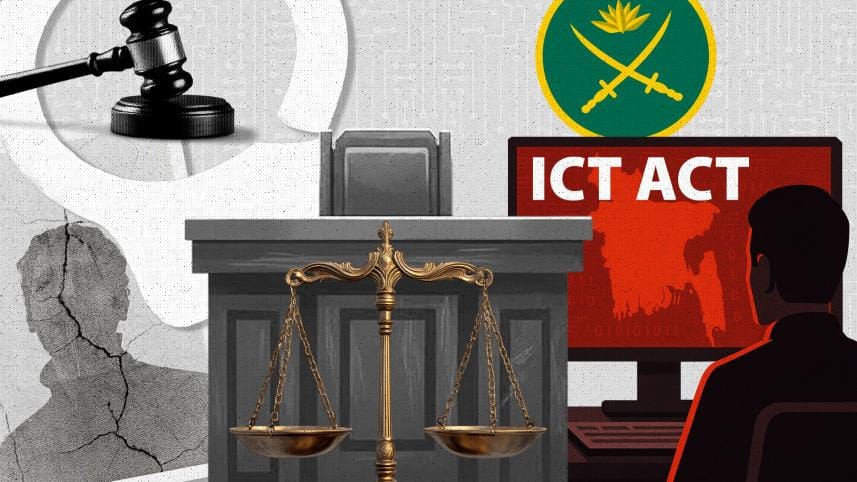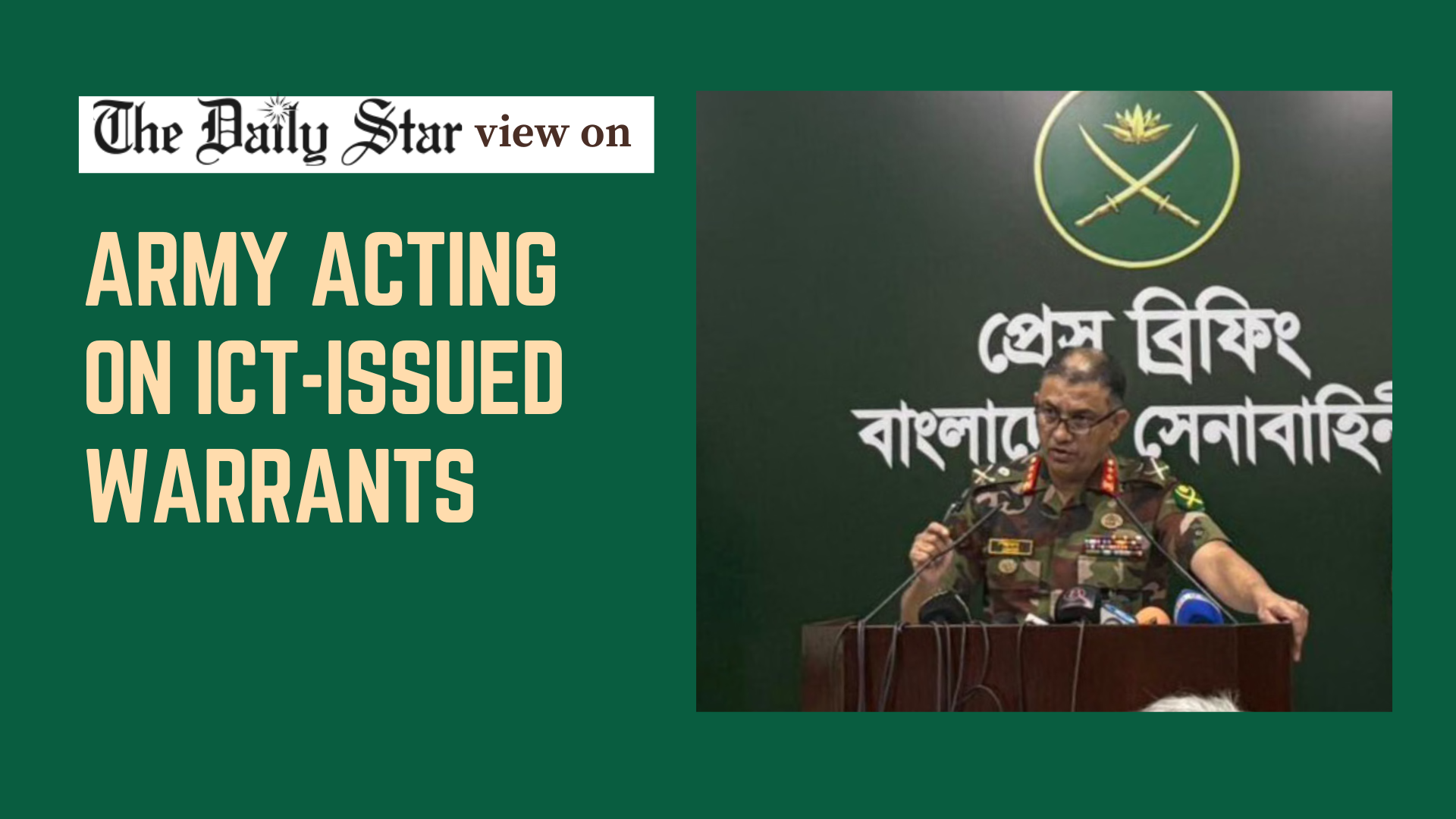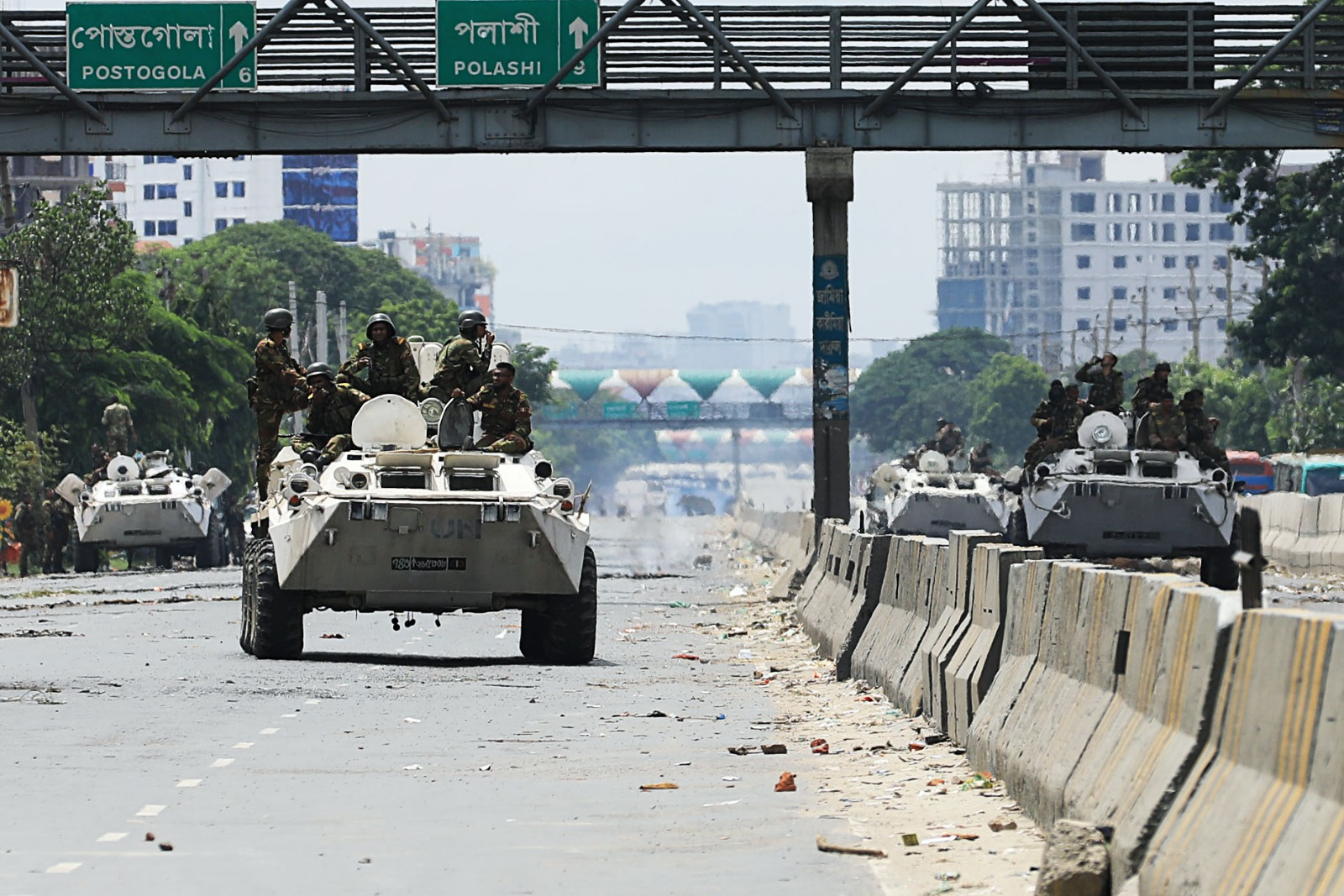Uniforms do not outrank the constitution

Recently, the army detained 15 officers following formal charges in three cases filed with the International Crimes Tribunal (ICT) over enforced disappearances committed under the Awami League government as well as killings during the July 2024 uprising. The arrest warrants issued by ICT have revived a familiar claim that soldiers are answerable only to court martial and that a civilian-style tribunal has no jurisdiction over them. This claim fails both on the text of the constitution and the text of relevant statutes. It also misreads the limited purpose of military discipline and the special status of laws on crimes against humanity and other crimes under international law, including enforced disappearance.
Let's start with the constitution. Article 47(3) gives laws on genocide, crimes against humanity, war crimes, and other crimes under international law a remarkable shield: such laws cannot be struck down for inconsistency with other provisions of the constitution. The clause expressly mentions members of the armed, defence, or auxiliary forces as possible subjects of those laws. Article 47A then restricts access to certain fundamental rights and to remedial jurisdiction for persons to whom those laws apply. These are not cosmetic flourishes. They are a constitutional declaration that international crimes law enjoys primacy, and that the uniform of an accused does not move them outside that legal architecture.
Next comes Article 45, which modifies the operation of the Fundamental Rights chapter for any disciplinary law relating to members of a disciplined force. But its purpose is limited to ensuring the proper discharge of duties and the maintenance of discipline. Article 45 is not a grant of exclusive military jurisdiction over every wrong that a soldier may commit. It is a shield for internal discipline, not a sword that carves international crimes out of the reach of parliament or the courts.
Let's turn to the International Crimes (Tribunals) Act (ICTA) now. As updated in November 2024, the Act made two decisive moves. First, it empowered the tribunal to try any individual or group—as well as any member of a disciplined force—for crimes under the Act, whether committed before or after the Act and within or beyond Bangladesh. Second, it modernised the list of crimes against humanity and expressly included enforced disappearance, with definitions cross-referenced to the Rome Statute of the International Criminal Court. The statutory text is plain on both points. The UN rights chief has already noted that the law now recognises enforced disappearance as a crime in domestic law, underscoring that the drafters intended contemporary reach, not only historical cases.
The Act also speaks to hierarchy and forum. Section 24 bars other courts or authorities from questioning tribunal orders except through the appeal route set in the statute. Section 26 states that the Act prevails over any inconsistent law in force. These two provisions close the backdoor for arguments that military law should displace the tribunal in this field. Bangladeshi jurisprudence has long described the tribunal as a domestic court of law under the Act, a characterisation that matters because it frames the tribunal as part of the national judicial order.
What, then, of the Army Act? The Army Act is a disciplinary statute. It determines service offences and permits court martial to try certain civil offences. But its own definitions show the limits. A civil offence under the Army Act means an offence triable by a criminal court (section 8(2)), and a criminal court means a court of ordinary criminal justice (section 8(7)). That is the key phrase. The tribunal is a special court created by a special statute with its own procedures; it is not a court of ordinary criminal justice within the meaning of the Army Act. The concurrency clause in section 94 of the Act allows a prescribed military authority to choose a forum only where a civil offence is triable both by a criminal court and by court martial. That concurrency does not reach crimes against humanity as defined by the ICTA, because such crimes are not triable by an ordinary criminal court. They are triable by the special tribunal created for that purpose.
Some points regarding section 549 of the Code of Criminal Procedure, dealing with the delivery to military authorities of persons liable to be tried by court martial, also need clarification. That section is a routing rule for cases actually triable by court martial. It does not convert crimes against humanity into service offences, nor does it trump the special forum chosen by parliament for international crimes. When the alleged wrong is an enforced disappearance, charged as part of a widespread or systematic attack on civilians, the proper legal vehicle is the ICTA, and the proper forum is the tribunal.
Two policy developments sharpen this analysis. First, the ICTA now contains a disqualification rule: a person against whom formal charges are pressed in the tribunal is disqualified from running for or holding public office, and from holding any post in the service of the republic until discharge or acquittal (section 20C). Second, there has been public debate about enacting a separate statute for enforced disappearance outside the context of crimes against humanity. That is a welcome track for the many cases that do not meet the threshold of a widespread or systematic attack. But when that threshold is met, the ICTA remains the correct vehicle.
So, if investigators frame charges invoking section 3 of the ICTA, then the proceeding belongs in the tribunal, even when the accused is a member of a disciplined force. Military authorities must cooperate on arrest and custody but cannot claim exclusive forum. Declaring a part of a cantonment as a sub-jail under the Prisons Act changes the place of lawful custody; it does not change the judicial forum or the duty to produce the accused before the tribunal when ordered. The tribunal issues production and remand orders, and the designated superintendent must obey. Legal geography cannot be used to avoid legal accountability. Moreover, the declaration of Dhaka Cantonment's MES building as a temporary jail was made by the Ministry of Home Affairs, which expressly sought its empowerment under section 541(1) of the Code of Criminal Procedure. This is a mistake as CrPC is inapplicable to ICTA proceedings as per section 23, and as such needs to be corrected.
Having said that the proceedings against the army personnel under the ICTA have been initiated following due course as the law currently stands, any solutions must protect fairness without draining accountability. The amended ICTA already provides for defence counsel and public observation of proceedings, among other fair trial guarantees. These safeguards should be applied rigorously to avoid the easy slur of political theatre. At the same time, the tribunal must insist on punctual production of detainees and full documentary transparency about arrest and custody.
Let's end by answering two blunt questions directly. First, can crimes of enforced disappearance or crimes against humanity be tried under the Army Act? No, not as the international crimes defined under the ICTA. The Army Act can punish service offences and some ordinary crimes as civil offences, but it cannot transform international crimes into disciplinary breaches. Second, is the ICTA the proper forum even when the accused belongs to a disciplined force? Yes. The constitution gives that law primacy. The ICTA gives the tribunal jurisdiction over members of disciplined forces. And the ICTA overrides inconsistent laws. That is the end of the jurisdictional story.
Barrister Khan Khalid Adnan is advocate at the Supreme Court of Bangladesh, fellow at the Chartered Institute of Arbitrators, and head of the chamber at Khan Saifur Rahman and Associates in Dhaka.
Views expressed in this article are the author's own.
Follow The Daily Star Opinion on Facebook for the latest opinions, commentaries and analyses by experts and professionals. To contribute your article or letter to The Daily Star Opinion, see our guidelines for submission.




 For all latest news, follow The Daily Star's Google News channel.
For all latest news, follow The Daily Star's Google News channel. 

Comments